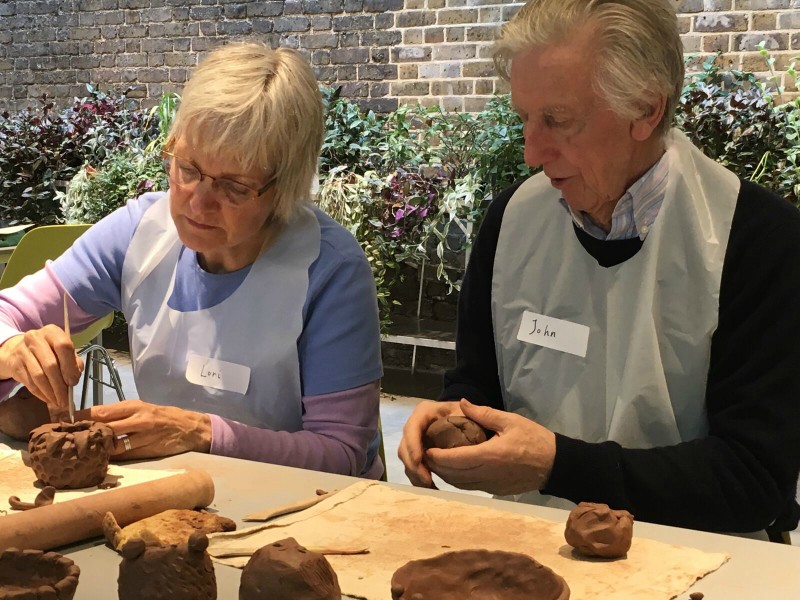Real stories
Noticing the signs and stages of Posterior Cortical Atrophy (PCA)
Watch this short film about Posterior Cortical Atrophy (PCA) and read Lori's story about noticing the signs of PCA in her husband, John.
It’s common knowledge that dementia is affecting an ever growing number of people in the UK.
A small proportion of those people are living with a rare type of the condition known as Posterior Cortical Atrophy (PCA) which famously affected the author Sir Terry Pratchett.
In this blog post, we share a beautiful short film that narrates the experiences of people living with PCA funded by Created Out of Mind and Alzheimer’s Society and directed by Simon Ball.
Find out more about this little known type of dementia and hear from Lori, a carer to her husband John who is living with PCA today.
What is Posterior Cortical Atrophy?
Posterior Cortical Atrophy (PCA) is a rare type of dementia that mostly affects vision during the early stages. It often starts in a person’s late 50s or early 60s.
PCA affects a part of the brain that makes sense of what our eyes are seeing. It’s also where we have a mental map of where different parts of our body are in relation to each other. When this part of the brain is affected by disease, it causes problems with vision, spatial awareness, and coordination.
Although PCA is usually caused by Alzheimer’s disease, it doesn’t tend to affect memory during its early stages. However, as it spreads to other parts of the brain it causes more common dementia symptoms, such as memory loss and confusion. Visual symptoms continue to get worse, eventually becoming similar to blindness.
Lori’s dementia story
Lori and John along with others affected by PCA featured in this powerful short film. The film beautifully illustrates the visual problems that are so common in those with PCA.
We spoke to Lori about her experience of caring for her husband John who was diagnosed with PCA in 2014.
What were the early PCA signs that you noticed in John?
For a good twelve to eighteen months before his diagnosis, I noticed subtle changes in John.
As these changes coincided with John’s retirement and also stopping smoking, we put some of it down to that.
John was always a brilliant driver and suddenly started to hit the curb and wasn’t able to park properly. He also seemed unable to discern lights and signs at night.
I started to notice other changes in John which were out of character.
John is meticulous in everything he does but when I came home and he said he’d been filing – I discovered his version of filing was taking a variety of important papers and putting them in the bin.
The biggest change was that John started to put everything in one drawer. He said that it was easier to find things if everything was in the same place. That's when I knew something was up.
What challenges have you and John faced together?
The first challenge was getting a diagnosis as John could still articulate himself well and had no awareness that anything untoward was going on.
When he was diagnosed we were shocked. I didn't even know the difference between Alzheimer’s and dementia, let alone know what PCA was.
Our biggest challenge was to not be defeated when we learned that the future we had planned had disappeared. We had to find a way to accept advice and support and take small steps to creating a new journey for ourselves.
How have you coped with these challenges?
Alzheimer’s Society was key in providing us with information and steering us to who to speak to. I immediately signed up with the local council's carers agency so that we could have their support and advice which was invaluable.
Through them, we learned about applying for Attendance Allowance, Power of Attorneys, and planning for the future. They even ran courses on how to keep our flat safe and dementia-friendly.

We attended a number of invaluable support groups to meet others who had just been diagnosed. At the PCA Support Groups, we not only met other people with PCA for the first time but met wonderful people working to bring more awareness of PCA to the public.
Although all of these services and support groups were a great help, there was one other thing that got us this far. It was us and our attitude. I tried to keep positive - if I was happy John was happy. I tried to get us involved in things that would enhance our journey and let us share it with others in the same situation.
We have kept active by attending dance classes at Ballet Rambert, cycling on Clapham Common with Positive Spin, Singing for the Brain in Balham, and attended programs sponsored by Arts4Dementia.
We have met wonderful teachers, volunteers and people living this journey. All I know is that since his diagnosis nearly 4 years ago, we have come a long way.
Seeking and accepting advice and support along the way has been vital. I have found taking part and sharing the way with others has made all the difference.
What advice would you give to those newly diagnosed with PCA?
Take a deep breath and reach out. Do not be afraid, someone is there with help and advice.

We have attended a range of events organised by Arts4Dementia including pottery and ceramics classes. Your neurologist should appoint you a dementia nurse who you will be able to guide you and answer your questions as you start this journey.
Join a carers and a PCA support group to meet others in the same situation.
You can always find support with Alzheimer’s Society and from your local council carers centre. On a practical note it’s important to get things in place early like power of attorney so you'll have it ready for the future.
Would you like to share your story?
If you've written a dementia story, we would love to hear about it. Please contact our Blog team if you're interested in telling us about your experience: [email protected].

